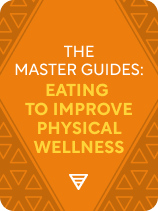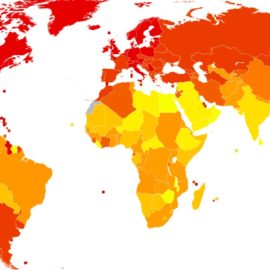

This article is an excerpt from the Shortform book guide to "The Master Guides: Eating to Improve Physical Wellness" by Shortform. Shortform has the world's best summaries and analyses of books you should be reading.
Like this article? Sign up for a free trial here.
Why does eating processed food make you feel tired and unsatisfied? What health problems can processed foods cause over time?
The effects of eating processed foods range from immediate energy crashes to serious long-term health complications. Leading researchers have uncovered compelling evidence about how these foods impact our bodies, from disrupting our natural glucose levels to increasing our risk of chronic diseases.
Continue reading to explore the science behind processed foods and learn how they affect your health—both now and in the future.
The Effects of Eating Processed Foods
Many experts including biochemist Jessie Inchauspé (The Glucose Revolution) recommend that you avoid processed foods and high-sugar foods that contribute to chronic diseases, inflammation, and hormonal imbalance. We’ll discuss what “processed food” means and then detail the short-term and long-term effects of eating processed foods.
Jason Fung (The Obesity Code) explains that highly refined carbs are starchy sugars that have been stripped of any fiber, protein, and micronutrients that you’d find in the whole food. Fung and Michael Pollan (In Defense of Food) note that white flour is a prime example of this, though rice, corn, and sugar have undergone similar processes.
According to How Not to Die by Michael Greger, these kinds of processed foods now contain much more sodium and caloric density than the primarily plant-based diet that humans ate for most of our evolution. In other words, our normal biological processes haven’t adapted to surviving on modern diets. In this section, we’ll dive deeper into what this means for our health and explain what these authors say about the short- and long-term health impacts of eating processed and high-sugar foods.
Short-Term Effects of Eating Processed Foods
Inchauspé explains that your mitochondria are responsible for turning glucose into energy, and this system works well when the amount of glucose your mitochondria receive matches the amount of energy your body needs. However, processed, nutrient-dense foods lead to glucose spikes: the glucose concentration in your body suddenly increases (and then dips) after you eat. When you experience a glucose spike, the mitochondria in your cells become overloaded. Mitochondria with too much glucose can’t produce energy efficiently. As a result, glucose spikes can make you feel dizzy, nauseous, and exhausted. They can also cause excess sweating, heart palpitations, stress, food cravings, and brain fog.
Fung adds that processed foods don’t satisfy your hunger because your body has no satiety signals associated with the refined carbs in foods such as white bread, snack cakes, crackers, chips, and pastries. In other words, these foods lack the protein, fat, and fiber that help you feel full.
Finally, processed foods amplify what Michael Greger calls the dopamine reward circuit: When you eat a processed, high-sugar food like ice cream, for example, you experience a jolt of pleasure and a sugar rush. Afterward, whole foods with a normal level of sugar, such as mangoes, are nowhere near as enjoyable. Greger notes that eating whole foods resets this sensitivity.
In the next section, we’ll explain how these short-term effects of glucose spikes can lead to long-term and chronic illness.
Long-Term Impact of Eating Processed Foods
One of the long-term effects of frequent glucose spikes from eating processed foods is chronically high levels of insulin: the hormone that regulates your blood sugar (The Obesity Code). When your body can’t produce enough insulin to match the excess sugar you’re consuming, this can lead to Type 2 diabetes (In Defense of Food).
Fung adds that glucose spikes can lead to a condition called fatty liver disease. Essentially, foods with added sugars, such as table sugar and high-fructose corn syrup, cause your liver to compensate by producing more insulin. Eventually, your liver becomes insulin resistant, requiring more insulin per unit to continue taking in sugar.
Inchauspé lists many additional long-term illnesses that can result from frequent glucose spikes:
1) Overloading the mitochondria with glucose leads to the release of free radicals.
2) Elevated glucose levels and frequent glucose spikes can lead to heart disease. This is because glucose spikes contribute to cholesterol accumulation beneath the lining of our blood vessels. This eventually inhibits blood flow and sets off heart disease.
3) Glucose spikes can increase your risk of cancer in a few ways. First, free radicals increase your risk of cancer-causing DNA mutations. Second, high glucose levels lead to chronic inflammation, which encourages the rapid increase of cancer cells. Finally, high levels of insulin make cancer spread faster, increasing the likelihood that the person will die from it.
Cognitive Effects of Glucose Spikes
Inchauspé also asserts that glucose spikes can contribute to mental health struggles and cognitive decline. Research suggests that people who eat diets that lead to frequent glucose spikes experience more mood disturbances and instances of depression than people whose diets result in more stable glucose levels.

———End of Preview———
Like what you just read? Read the rest of the world's best book summary and analysis of Shortform's "The Master Guides: Eating to Improve Physical Wellness" at Shortform.
Here's what you'll find in our full The Master Guides: Eating to Improve Physical Wellness summary:
- The two simple guidelines for eating well
- How to distinguish beneficial foods from harmful foods
- Why supplements aren’t worth it—except in some cases






